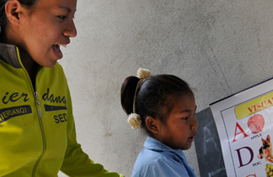Impact: The Santi School Project (SSP) has proposed a specialized training program for 100 primary school teachers in rural Nepal, supplemented by a volunteer corps of 12 urban high school graduates to support participating teachers in their classrooms. We estimate the project will benefit more than 2,500 children.
Training content
The teacher training program emphasizes early childhood education practices as well as English language skills. We designed the training to bring concepts of child development and child-friendly classroom strategies to public schools in rural Nepal, where resources are typically inadequate. The training encourages teachers to find ways to incorporate these strategies into their existing local contexts, such as using locally available materials to create classroom materials.
Volunteer corps
Our innovative volunteer program helps meet the need for competent English speakers in remote areas of the country and provides a rare platform for young urban and rural Nepalis to exchange ideas and broaden their horizons. Volunteers will help provide extracurricular activities such as music, art and sports. Each school with teachers participating in our program will receive a volunteer for two months.
Conduct of training
We will hire two trainers to conduct training for 100 teachers. The teachers will be divided into four groups and the training will be held in four different centers, with each center catering to approximately 25 teachers from nearby schools. The training will consist of a series of 2-day sessions of lectures and workshops to practice the new teaching strategies followed by
classroom observations of each participating teacher. This cycle will be repeated six times for a total of 12 days of instruction and six separate classroom evaluations over a 24-week period.
Local participation
Local-level officers of the District Education Office, the government body responsible for monitoring public schools in Nepal, will help recruit teachers, visit training sessions, provide feedbackto trainers and teachers, and may also participate in the teacher evaluation phase.In addition, school principals will be welcome to participate in the training sessions as well asthe individual teacher observations. At the halfway point of the program and again after the finalobservation, the trainer will provide written feedback to each teacher during a conference with the teachers and the school’s principal.
Teacher motivation
Because motivating public school teachers is one of the biggest challenges of the education system in Nepal, we include small cash awards in our training program as an incentive for teachers to implement what they have learned in the training. The incentives are based on classroom observations and are provided only to top performers.
Assessment
Results of the training will be measured both qualitatively, though repeated classroom observations of the teachers, and quantitatively, with a student exam. The students of teachers enrolled in the training program will all take an exam designed by SSP and the trainer before and after the training. If possible, a control group of students, whose teachers are not participating in the program, will also take the exam.

 Every time you purchase a book, we donate a book to someone in need.
Every time you purchase a book, we donate a book to someone in need.
